| 日本の名作童話 | |||||||||||||||||||||||
 |
|||||||||||||||||||||||
| 作 : 新美 南吉 絵 : 岩本 康之亮 |
|||||||||||||||||||||||
 |
|||||||||||||||||||||||
| 中表紙 |
|||||||||||||||||||||||
| Gon,the Little Fox | |||||||||||||||||||||||
| 壱 (One) | |||||||||||||||||||||||
 |
|||||||||||||||||||||||
| これは、わたしが小さい時に、村の ” もへい ”という おじいさんから聞いたお話です。 This is a story I heard from an old man named Mohei who lived in the village when I was little. |
|||||||||||||||||||||||
むかしは、わたしたちの 村の近くの、中山というところに、小さな おしろがあって、 ” 中山さま ” という おとのさまが、おられたそうです。 Back then, there was a small castle near our village called Nakayama, and there was a lord called Nakayama-sama. |
|||||||||||||||||||||||
|
|||||||||||||||||||||||
その中山から、すこしはなれた 山の中に、「ごんぎつね」という きつねがいました |
|||||||||||||||||||||||
| There was a fox named “Gon fox” in a mountain that was a little far from Nakayama. |
|||||||||||||||||||||||
” ごん " は、ひとりぼっちの小ぎつねで、シダ のいっぱいしげった 森の中に、穴(あな)をほって 住んでいました。 そして、夜でも 昼でも、あたりの村へ 出ていって、いたずらばかりしました。 Gon was a little fox who lived alone in a hole, in a forest full of fern. Then, at night or noon, he went out to the villages around and he was always getting into mischiefs. |
|||||||||||||||||||||||
|
|||||||||||||||||||||||
畑へ入って いもを ほりちらしたり、菜種(なたね)がらの、 ほしてあるのへ 火をつけたり、百姓家(ひゃくしょうや)の うら手に つるしてある とんがらし を むしり取って いったり、いろんなことを しました。 He went into the field and dug up the potatoes, set the fire on the dried rapeseed husks, ripped off the red peppers hung on the back of the farmhouse, and did various things. |
|||||||||||||||||||||||
|
|||||||||||||||||||||||
ある秋の ことでした。二、三日 雨が ふりつづいた その間、 ” ごん ” は、外へも出られなくて、あなの中に しゃがんで いました。 One autumn. While it rained for a few days, Gon was squatting down in the hole and couldn’t go outside. |
|||||||||||||||||||||||
 |
|||||||||||||||||||||||
| 雨が あがると、” ごん " は、ほっとして あなから はい出ました。 When it stopped raining, Gon was relieved and crawled out from the hole. |
|||||||||||||||||||||||
空は からっと 晴れていて、もずの 声が きんきん、ひびいていました。 The sky was clearly sunny and the voice of the shrike was shrilly echoing. |
|||||||||||||||||||||||
|
|||||||||||||||||||||||
| ” ごん " は、村の 小川の つつみまで 出てきました。 Gon came out around the bank of the stream in the village. あたりの、すすきの穂 には、まだ雨の しずくが、光っていました。 The raindrops were still shining on the spikes of the maiden silver grass. 川は いつもは 水が少ないのですが、三日もの 雨で、水が、どっと ましていました。 The water level of the river is usually low, but due to the rain that continued for three days, the water volume was increasing a lot. |
|||||||||||||||||||||||
ただの ときは 水につかる ことの ない、川べりの すすきや、はぎの かぶが、 黄いろく にごった 水に、よこだおしに なって、もまれています。 ” ごん " は 川下の方へと、ぬかるみ道を 歩いていきました。 The maiden silver grass and the roots of the shrubby bushclover which usually doesn’t get soaked in the water, but is now being rubbed in the yellow cloudy water in a sideways state. Gon walked along the muddy road toward the downstream. |
|||||||||||||||||||||||
|
|||||||||||||||||||||||
| ふと見ると、川の中に 人がいて、何か やっています。 At a casual glance, there are people in the river doing something. |
|||||||||||||||||||||||
|
|||||||||||||||||||||||
” ごん " は、見つからないように、そうっと 草の ふかいところへ 歩きよって、 そこから じっと のぞいて みました。 Gon walked deep into the grass carefully so that no one would find him, and peeped at them from there without moving. |
|||||||||||||||||||||||
|
|||||||||||||||||||||||
「兵十(ひょうじゅう)だな」と、” ごん " は 思いました。 “It’s Hyoju,” Gon thought. |
|||||||||||||||||||||||
 |
|||||||||||||||||||||||
| 兵十(ひょうじゅう)は ぼろぼろの 黒い着物を まくし上げて、腰(こし)のところまで 水に ひたりまがら、魚をとる、はりきりという あみを ゆすぶっていました。 Hyoju was shaking a net called a Harikiri to catch fish with his shabby black kimono rolled up and immersed his body up to the waist with water. |
|||||||||||||||||||||||
|
|||||||||||||||||||||||
はちまきを した 顔の横っちょうに、まるい はぎの葉が 一まい、 大きな ほくろみたいに へばりついていました。 A round shrubby bushclover’s leave was clinging on the side of his face, wearing a headband, like a large mole. |
|||||||||||||||||||||||
しばらくすると、兵十(ひょうじゅう)は、はりきりあみの いちばんうしろの、 ふくろのように なった所を、水の中から 持ち上げました。 After a while, Hyoju raised the rear part of the Harikiri, which looked like a bag, out of the water. |
|||||||||||||||||||||||
その中には、しばの根や、草の葉や、くさった 木ぎれなどが、ごちゃごちゃ 入っていましたが、でも ところどころ、白い ものが きらきら 光っています。 In the bag, there were shrub roots, grass leaves, rotten wood chips, and so on jumbled together. but here and there, white things were shining brilliantly. |
|||||||||||||||||||||||
| それは、ふとい うなぎ の腹や、大きな きす の腹でした。 兵十(ひょうじゅう)は、びくの中へ、その うなぎ や きすを、 ごみといっしょに ぶちこみました。 It was the thick eel’s belly and the big sillago’s belly. Hyoju threw the eels and sillagos into the creel basket together with the trash. そしてまた、ふくろの口を しばって、水の中に 入れました。 And again, he tied the opening of the bag and put it in the water. |
|||||||||||||||||||||||
|
|||||||||||||||||||||||
 |
|||||||||||||||||||||||
兵十(ひょうじゅう)は、それから、びくを 持って 川から 上がり、 びくを 土手に おいといて、何を さがしにか、川上の 方へ かけていきました。 Hyoju then went up from the river with the creel basket on his hand, then putting the creel on the bank, and ran up the river to look for something. |
|||||||||||||||||||||||
|
|||||||||||||||||||||||
兵十(ひょうじゅう)がいなくなると、” ごん ” は、 ぴょいと 草の中から とび出して、びくの そばへ かけつけました。 When Hyoju was gone, Gon nimbly jumped out of the grass and ran up to the side of the creel basket. |
|||||||||||||||||||||||
|
|||||||||||||||||||||||
ちょいと、いたずらが したくなったのです。 He wanted to play a trick a bit. |
|||||||||||||||||||||||
” ごん ” は びくの中の 魚をつかみ出しては、はりきりあみの かかっている ところより 下手(しもて)の川の中を 目がけて、ぽんぽん投げこみました。 Gon started to take the fish out from the creel basket and throw them one after another aiming below the Harikiri at the river downstream. |
|||||||||||||||||||||||
どの魚も、「とぼん」と 音を 立てながら、にごった 水の中へ もぐりこみました。 Every fish dived into the muddy water with a plop. |
|||||||||||||||||||||||
|
|||||||||||||||||||||||
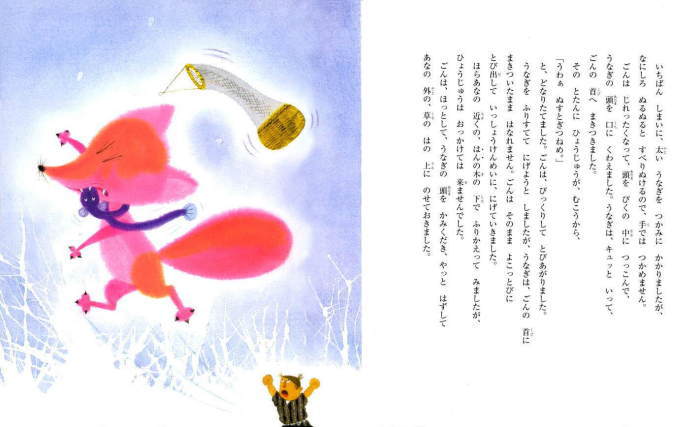 |
|||||||||||||||||||||||
いちばん しまいに、太いうなぎを つかみに かかりましたが、なにしろ ぬるぬると すべりぬけるので、手では つかめません。 In the end, he tried to catch a thick eel, but he couldn’t grab it by his hands because it slimily slipped out. |
|||||||||||||||||||||||
” ごん ” は じれったくなって、頭を びくの 中に つっこんで、うなぎの 頭を 口に くわえました。うなぎは、キュッと いって、ごんの 首へ まきつきました。 Gon was frustrated, so he put his head in the creel basket and held the head of the eel in his mouth. The eel squeaked and clung around Gon’s neck. |
|||||||||||||||||||||||
その とたんに 兵十(ひょうじゅう)が、向こうから、 「うわあ、ぬすとぎつねめ。」と、どなりたてました。 Immediately after that, Hyoju yelled from over there, “Wow, You sneaky fox.” |
|||||||||||||||||||||||
|
|||||||||||||||||||||||
” ごん ” は、びっくりして とび上がりました。うなぎを ふりすてて にげようと しましたが、うなぎは、ごんの首に まき付いたまま はなれません。 Gon was surprised and jumped up. He tried to throw off the eel and run, but the eel stayed clung around Gon’s neck and didn’t come off. |
|||||||||||||||||||||||
” ごん ” は、そのまま 横っとびに とび出して いっしょうけんめいに、にげていきました。 Gon jumped sideways, leaving the eel as it was and ran away very hard. |
|||||||||||||||||||||||
ほらあなの 近くの、はんの木の 下で ふりかえって みましたが、 兵十(ひょうじゅう)は 追っかけては 来ませんでした。 He looked back under the Alnus tree near the cave, but Hyoju did not come after him. |
|||||||||||||||||||||||
|
|||||||||||||||||||||||
” ごん ” は、ほっとして、うなぎの 頭を かみくだき、やっとはずして 穴の外の、 草の葉の 上にのせておきました。 Gon was relieved, he bit the eel’s head down, barely removed it, and left it outside the hole on the leaves of the grass. |
|||||||||||||||||||||||
|
|||||||||||||||||||||||
| 弐 (two) | |||||||||||||||||||||||
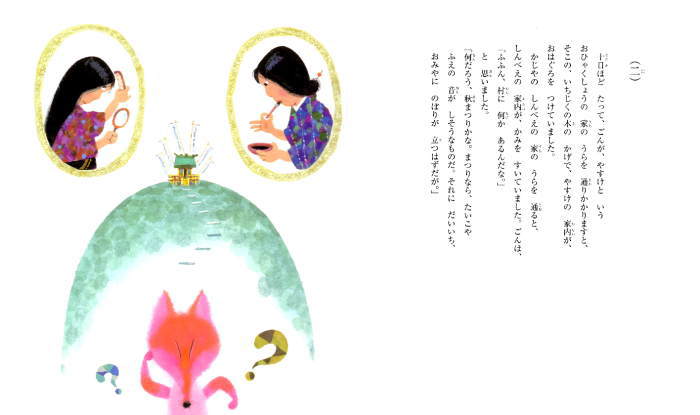 |
|||||||||||||||||||||||
十日ほど たって ” ごん " が、弥助(やすけ)という お百姓の 家の うらを とおりかかりますと、そこの、いちじくの木のかげで、 弥助(やすけ)の家内(かない)が、おはぐろを付けていました。 About ten days later, when Gon passed by the house of a peasant named Yasuke, Yaesuke’s wife was blackening her teeth in the shade of a fig tree. |
|||||||||||||||||||||||
|
|||||||||||||||||||||||
かじ屋の新兵衛(しんべえ)の家の うらをとおると、 新兵衛(しんべえ)の家内(かない)が、かみをすいていました。 When he walked passed the back of the blacksmith Shinbei’s house, Shinbei’s wife was combing her hair. |
|||||||||||||||||||||||
|
|||||||||||||||||||||||
” ごん ” は、「ふふん。村に何かあるんだな。」と思いました。 Gon thought, “Huh, there’s something in the village.” |
|||||||||||||||||||||||
「なんだろう、秋祭りかな。祭りなら、たいこや ふえの音が しそうなものだ。 それに第一、お宮に のぼりが 立つはずだが。」 “I wonder what it is, the Autumn Festival? If it’s a festival, there is likely a sound of a drum or a flute. And first of all, they will raise a banner in the shrine.” |
|||||||||||||||||||||||
|
|||||||||||||||||||||||
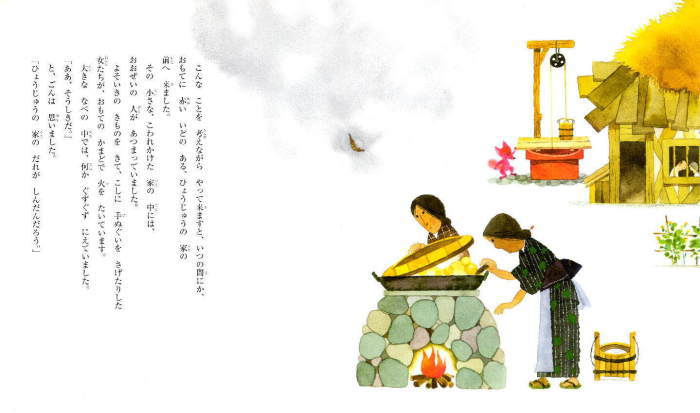 |
|||||||||||||||||||||||
| こんなことを 考えなが やってきますと、いつのまにか、表に 赤い井戸のある、 兵十(ひょうじゅう)の 家の前へ 来ました。 While thinking aboot this,before he knew it, he came in front of Hyoju’s house, which has a red-colored well. |
|||||||||||||||||||||||
|
|||||||||||||||||||||||
その小さな、こわれかけた 家の中には、おおぜいの人が 集まっていました。 Many people were gathering in his small broken house. よそいきの着物を 着て、腰に手ぬぐいを下げたりした 女たちが、表のかまどで火をたいています。 Women wearing a formal kimono and hanging a washcloth on their waist are setting fire on the stove in the front. |
|||||||||||||||||||||||
大きな なべの中では、何か ぐずぐず にえていました。 「ああ、そうしきだ。」と、” ごん ” は思いました。 「兵十(ひょうじゅう)の家のだれが死んだんだろう。」 In the big pot, something was simmering. “Oh, it’s a funeral,” Gon thought. “Who’s dead in Hyoju ‘s family?” |
|||||||||||||||||||||||
|
|||||||||||||||||||||||
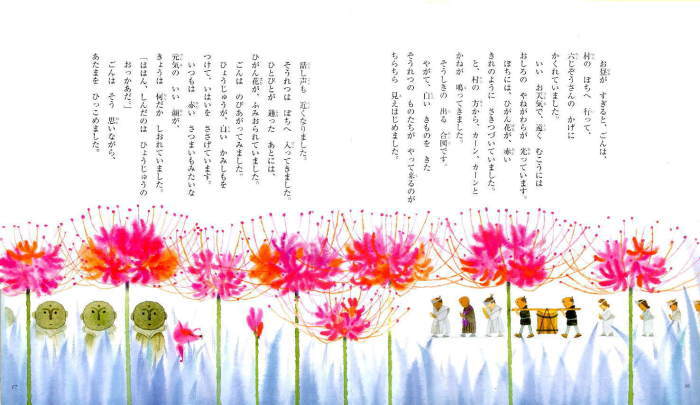 |
|||||||||||||||||||||||
| お昼が過ぎると、” ごん ” は、村の墓地(ぼち)へ行って、六地蔵(ろくじぞう)さんの かげに かくれていました。 The afternoon, Gon went to the village cemetery and was hiding behind the six Jizo. |
|||||||||||||||||||||||
|
|||||||||||||||||||||||
いいお天気で、遠く向こうには、お城の やねがわらが 光っています。 墓地には、ひがん花が、赤い きれのように さき続いて いました。 The weather was nice and the roofing tiles of the castle shined far over there. In the cemetery, red spider lilies were blooming and spreading like red cloths. |
|||||||||||||||||||||||
|
|||||||||||||||||||||||
と、村の方から、カーン、カーンと 鐘(かね)が鳴ってきました。そう式の出る合図です。 Suddenly, he heard the sound of a bell ringing, dong, dong, from the village. It’s a signal that the funeral is coming out. |
|||||||||||||||||||||||
やがて、白い着物を着た そうれつの 者たちが やってくるのが ちらちら見え始めました。 Then, he faintly began to see the people of the funeral procession wearing white kimonos. |
|||||||||||||||||||||||
|
|||||||||||||||||||||||
話し声も 近くなりました。そう列は 墓地へ 入ってきました。 The voice was getting closer. So the line entered the graveyard. |
|||||||||||||||||||||||
|
|||||||||||||||||||||||
人々が 通った後には、ひがん花が、ふみ折られていました。 After the people passed, the red spider lilies were trodden and folded. |
|||||||||||||||||||||||
|
|||||||||||||||||||||||
” ごん ” は のび上がって見ました。 兵十(ひょうじゅう)が、白い かみしもを 付けて、位はいを さげています。 Gon stretched up and watched. Hyoju is wearing a white " kamishimo " and devotedly holding an " ihai ". |
|||||||||||||||||||||||
|
|||||||||||||||||||||||
いつもは 赤いさつまいも みたいな 元気のいい顔が、 今日はなんだかしおれていました。 His cheerful face that usually looks like a red sweet potato was somewhat wilted today. |
|||||||||||||||||||||||
|
|||||||||||||||||||||||
| 「ははん。死んだのは兵十(ひょうじゅう)のおっかあだ。」 ” ごん ” は、そう思いながら、頭を ひっこめました。 “ Uh-hah. It’s Hyoju’s mom who died. ” Gon thought so, and he pulled back his head. |
|||||||||||||||||||||||
|
|||||||||||||||||||||||
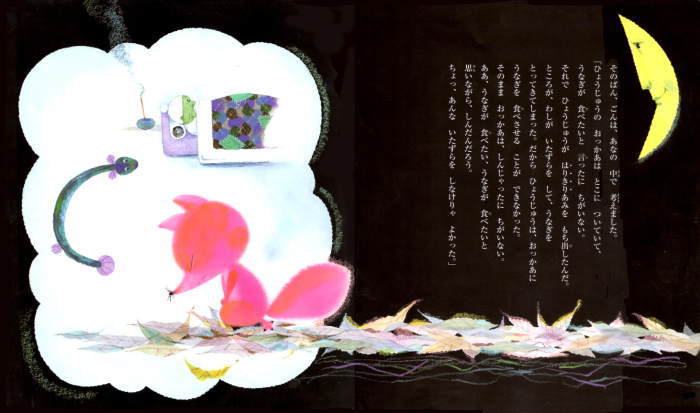 |
|||||||||||||||||||||||
| その晩(ばん)、” ごん ” は、あなの中で 考えました。 That night, Gon thought about it in his hole. |
|||||||||||||||||||||||
「兵十の おっかあは、床(とこ)についていて、うなぎが 食べたいと 言ったにちがいない。それで 兵十が はりきりあみを 持ち出したんだ。 “Hyoju’s mom must be on the bed and says she wants to eat the eel. That’s why Hyoju brought out a " Harikiri " . |
|||||||||||||||||||||||
ところが、わしが いたずらをして、うなぎを 取って来て しまった。 だから兵十は、おっかあに うなぎ を食べさせることが できなかった。 However, I made mischief and took the eel. So Hyoju couldn’t let his mom eat the eel. |
|||||||||||||||||||||||
|
|||||||||||||||||||||||
そのまま おっかあは、死んじゃったに ちがいない。 ああ、うなぎが 食べたい、うなぎが 食べたい と思いながら、死んだんだろう。 His mom must have died just as it was. She would have died hoping, Oh, I want to eat the eel, I want to eat the eel. |
|||||||||||||||||||||||
| ちょっ、あんな いたずらを しなけりゃ よかった。」 Shucks, I should not have done the mischief.” |
|||||||||||||||||||||||
|
|||||||||||||||||||||||
| 参 (Three) | |||||||||||||||||||||||
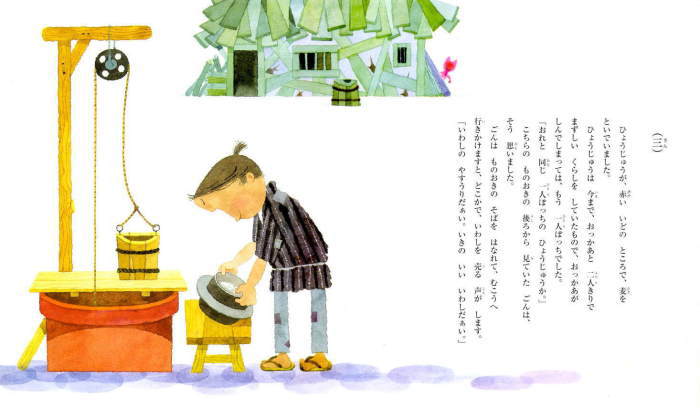 |
|||||||||||||||||||||||
| 兵十(ひょうじゅう)が、赤い井戸の ところで、麦 をといでいました。 Hyoju was washing wheat at the red-colored well. |
|||||||||||||||||||||||
|
|||||||||||||||||||||||
兵十(ひょうじゅう)は 今まで、おっかあと 二人きりで 貧しいくらしを し ていたもので、 おっかあが 死んでしまっては、もう ひとりぼっちでした。 Until now, Hyoju had lived in poverty with his mom, so he became lonely after his mom died. |
|||||||||||||||||||||||
|
|||||||||||||||||||||||
「おれと 同じ ひとりぼっちの 兵十(ひょうじゅう)か。」 こちらの ものおきの 後ろから 見ていた ” ごん " は、そう思いました。 “Hyoju is alone, like me” Gon thought so, looking at it from behind the storage here. |
|||||||||||||||||||||||
|
|||||||||||||||||||||||
” ごん " は ものおきの そばを はなれて、むこうへ いきかけますと、 どこかで、いわしを 売る声が します。 「いわしの安売りだぁい。生きのいい、いわしだぁい。」 As Gon left the storage and went to the other side, he heard a voice selling sardines somewhere. “It’s a bargain for sardines. these are fresh sardines.” |
|||||||||||||||||||||||
|
|||||||||||||||||||||||
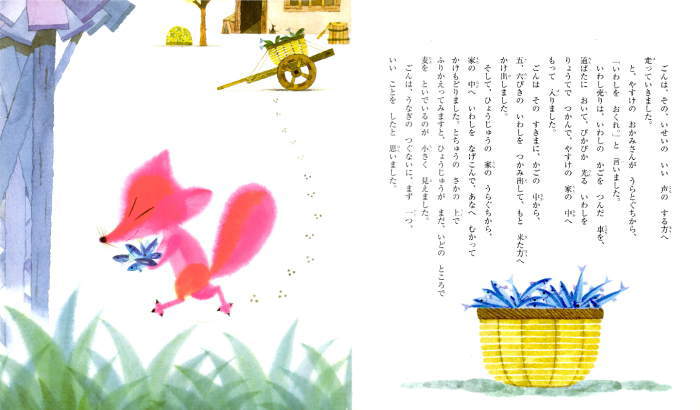 |
|||||||||||||||||||||||
| ” ごん ” は、その、いせいの いい声の する方へ 走っていきました。 Gon ran in the direction of the energetic voice. |
|||||||||||||||||||||||
|
|||||||||||||||||||||||
と、弥助(やすけ)の おかみさんが うら戸口から、「いわしをおくれ。」と 言いました。 Suddenly, from the back door, Yasuke’s wife said, “I’ll take some sardines.” |
|||||||||||||||||||||||
いわし売りは、いわしのかごを つんだ車を、道ばたに 置いて、ぴかぴか光る いわしを 両手で つかんで、弥助(やすけ)の 家の中へ 持って 入りました。 The sardine seller put his wagon on the side of the road and grabbed the shiny sardines with both hands, and brought them into Yasuke’s house. |
|||||||||||||||||||||||
|
|||||||||||||||||||||||
” ごん ” は、そのすきまに、かごの中から、 五、六匹の いわしを つかみ出して、もと来た方へ かけ出しました。 Taking the chance, Gon caught five or six sardines from the basket and ran back to where he came from. |
|||||||||||||||||||||||
そして、兵十(ひょうじゅう)の 家の うらぐちから、 家の中へ いわしを なげこんで、穴へ向かって かけもどりました。 Then he threw sardines into Hyoju’s house from the back door and ran back to his hole. |
|||||||||||||||||||||||
とちゅうの 坂の上で ふり返ってみますと、兵十(ひょうじゅう)が まだ、 井戸の ところで 麦を といでいるのが 小さく 見えました。 While Gon turned around on the top of the steep, he could see that Hyoju was still washing wheat at the well. |
|||||||||||||||||||||||
” ごん ” は、うなぎのつぐないに、まず一つ、いいことを したと思いました。 To begin with, Gon thought that he did a good thing, for the compensation for the eel. |
|||||||||||||||||||||||
|
|||||||||||||||||||||||
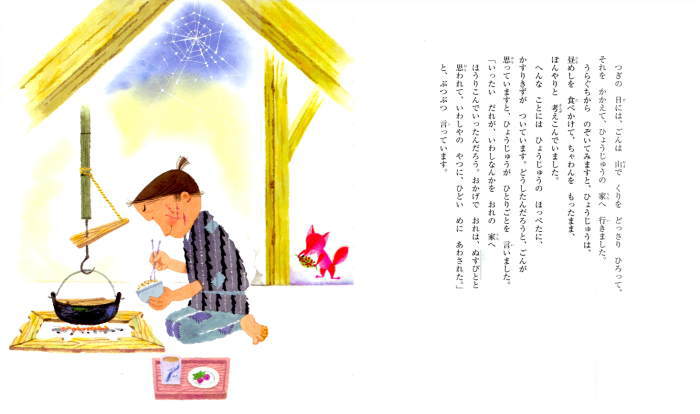 |
|||||||||||||||||||||||
| 次の日には、” ごん ” は 山で くりを どっさり拾って、 それをかかえて、兵十(ひょうじゅう)の家へ 行きました。 The next day, Gon picked up a lot of chestnuts, held them, and went to Hyoju’s house. |
|||||||||||||||||||||||
|
|||||||||||||||||||||||
うら口から のぞいてみますと、兵十(ひょうじゅう) は、昼めしを食べかけて、茶わんを 持ったまま、ぼんやりと 考えこんでいました。 When he peeked from the back door, Hyoju was about to eat lunch, pondering vaguely, holding the rice bowl in his hand. |
|||||||||||||||||||||||
|
|||||||||||||||||||||||
変なことには、兵十(ひょうじゅう)の ほっぺたに、かすりきずが ついています。 The strange thing was that Hyoju has a scratch on his cheeks. |
|||||||||||||||||||||||
|
|||||||||||||||||||||||
どうしたんだろうと、” ごん ” が思っていますと、 兵十(ひょうじゅう)が ひとりごとを言いました。 While Gon was wondering what happened, Hyoju spoke to himself. |
|||||||||||||||||||||||
「いったい だれが、いわしなんかを おれの家へ ほうりこんでいったんだろう。 おかげで おれは、ぬすびとと 思われて、いわし屋のやつに、ひどい目に あわされた。」 と、ぶつぶつ言っています。 “ Who in the world threw those sardines into my house ? Thanks to that, the sardine seller thought I was the thief and put me into a terrible situation ”, he muttered. |
|||||||||||||||||||||||
|
|||||||||||||||||||||||
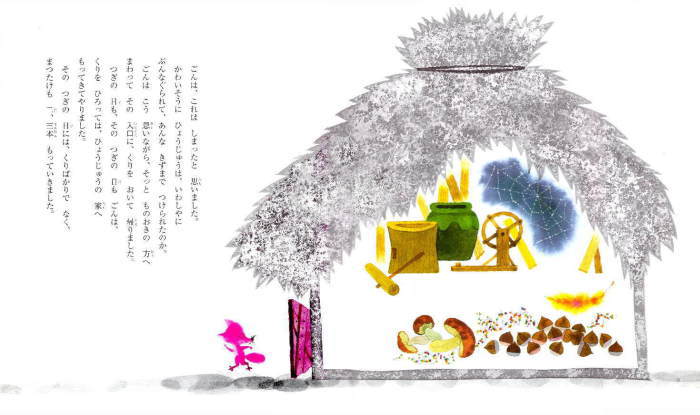 |
|||||||||||||||||||||||
| ” ごん ” は、これは しまったと 思いました。 Gon thought this was wrong. |
|||||||||||||||||||||||
かわいそうに 兵十(ひょうじゅう)は、 いわし屋に ぶんなぐられて、あんな きずまで 付けられたのか。 Too bad, Hyoju got such a wound by being hit by the sardine seller. |
|||||||||||||||||||||||
|
|||||||||||||||||||||||
| ” ごん ” は、こう思いながら、そっと 物置の方へ回って、 その 入口に くりを 置いて帰りました。 Thinking this way, Gon gently turned to the storage and left chestnuts at the entrance, and went home. |
|||||||||||||||||||||||
| 次の日も、その次の日も、” ごん ” は、くりを 拾っては、 兵十(ひょうじゅう)の家へ持ってきてやりました。 The next day and the next day, Gon picked up chestnuts and brought them to Hyoju’s house. |
|||||||||||||||||||||||
| その 次の日には、くりばかりでなく、まつたけも、二、三本 持っていきました。 On the next day, he brought not only chestnuts but also a few matsutake mushrooms. |
|||||||||||||||||||||||
|
|||||||||||||||||||||||
| 肆 (Four) | |||||||||||||||||||||||
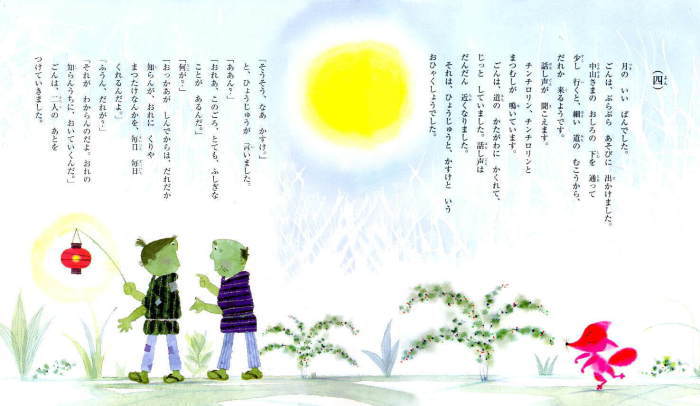 |
|||||||||||||||||||||||
| 月の いい晩でした。” ごん ” は、ぶらぶら遊びに出かけました。 It was a beautiful moon this evening. Gon went out to play aimlessly. |
|||||||||||||||||||||||
|
|||||||||||||||||||||||
中山さまの お城の下を 通って少し行くと、細い道の向こうから、だれか来るようです。 As he went passing a little by Mr.Nakayama's castle, it seemed that someone was coming over from a narrow road. |
|||||||||||||||||||||||
話し声が聞こえます。チンチロリン、チンチロリンと松虫が鳴いています。 ” ごん ” は、道の片側にかくれて、じっとしていました。 He heard a voice talk. The pine crickets were chirping. Gon hid on one side of the road and stayed still. |
|||||||||||||||||||||||
|
|||||||||||||||||||||||
話し声は だんだん近くなりました。それは、兵十と加助(かすけ)というお百姓でした。 The talking voice gradually got closer. It was Hyoju and a farmer named Kasuke. |
|||||||||||||||||||||||
「そうそう、なあ加助。」と、兵十が言いました。 “Oh yeah, Kasuke.” Hyoju said. 「ああん?」 “Hah ?” 「おれあ、このごろ、とても、ふしぎなことがあるんだ。」 “To me, these days, something very strange has been happening.” 「何が?」 “Like what?” 「おっかあが死んでからは、だれだか知らんが、おれにくりや松たけなんかを、毎日くれるんだよ。」 “Since my mother died, someone has been giving me things like chestnuts, mushrooms, and so on every day.” 「ふうん。だれが?」 “Huh, Who?” 「それが、わからんのだよ。おれの知らんうちに、置いていくんだ。」 “I have no idea. Someone left them while I wasn’t paying attention.” |
|||||||||||||||||||||||
ごんは、二人の後をつけていきました。 Gon followed the two men. |
|||||||||||||||||||||||
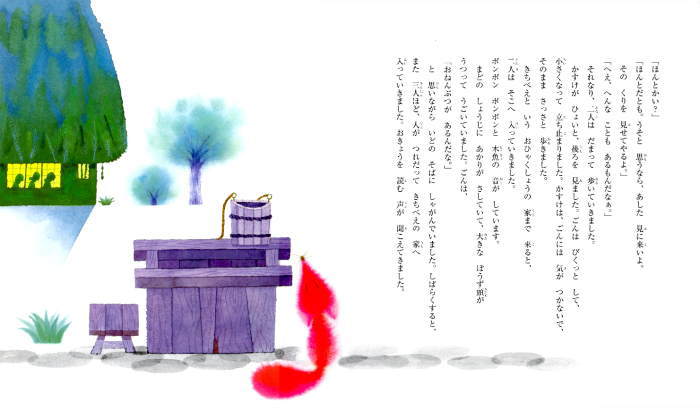 |
|||||||||||||||||||||||
| 「ほんとかい?」 「ほんとだとも。うそと思うなら、あした見に来いよ。そのくりを見せてやるよ。」 “Are you for real?” “It’s true. If you think I’m lying, come by to see them tomorrow. I’ll show you the chestnuts.” |
|||||||||||||||||||||||
「へえ、へんなことも あるもんだなぁ」 それなり、二人はだまって歩いていきました。 “Huh, that’s something strange.” As they were, the two men walked away silently. |
|||||||||||||||||||||||
加助がひょいと、後ろを見ました。 ” ごん ” はびっくりして、小さくなって立ち止まりました。 加助は、” ごん ” には気が付かないで、そのまま さっさと 歩きました。 Suddenly, Kasuke looked back. Gon was frightened, shrank down, and stopped. Kasuke walked straight through without noticing Gon. |
|||||||||||||||||||||||
|
|||||||||||||||||||||||
吉兵衛(きちべえ)というお百姓の家まで来ると、二人は そこに入っていきました。 When the two men came to a peasant house called Kichibee, they walked inside. |
|||||||||||||||||||||||
|
|||||||||||||||||||||||
ポンポンポンポン と 木魚(も くぎょ) の音が しています。 He heard the sounds of a wooden fish drum. |
|||||||||||||||||||||||
|
|||||||||||||||||||||||
まどのしょうじに あかりが さしていて、大きな ぼうず頭が うつって動いていました。 The light was breaking through the paper screen on the window and displayed a moving shadow from a large priest’s bald head. |
|||||||||||||||||||||||
|
|||||||||||||||||||||||
” ごん ” は、「お念仏(ねんぶつ)があるんだな。」 と思いながら、井戸のそばに しゃがんでいました。 Gon was squatting down by the well, thinking, “They will have a chant.” |
|||||||||||||||||||||||
|
|||||||||||||||||||||||
しばらくすると、また三人ほど、人が連れ立って、吉兵衛の家に 入っていきました。 お経(きょう)を 読む声が 聞こえてきました。 After a while, about three people joined together and entered into Kichibee’s house. Gon heard the voices of reading a sutra. |
|||||||||||||||||||||||
|
|||||||||||||||||||||||
| 伍 (Five) | |||||||||||||||||||||||
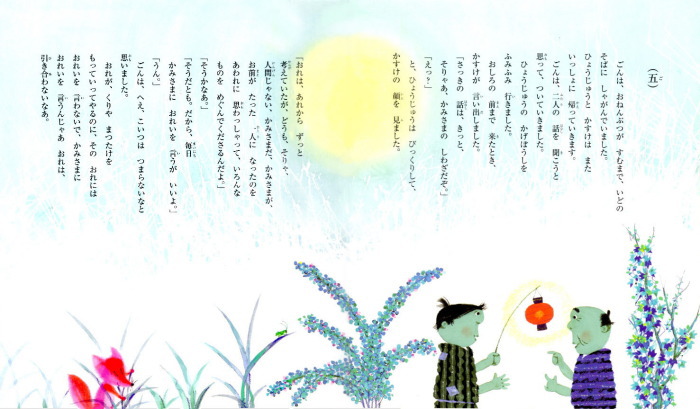 |
|||||||||||||||||||||||
” ごん ” は、お念仏がすむまで、井戸のそばにしゃがんでいました。 Gon squatted down by the well until the chant was finished. |
|||||||||||||||||||||||
兵十と加助はまたいっしょに帰っていきます。 Hyoju and Kasuke left together again. |
|||||||||||||||||||||||
ごんは、二人の話を聞こうと思って、ついていきました。 兵十のかげほうしをふみふみいきました。 Gon followed, thinking that he would like to hear the conversation of the two men. He stepped and went with Hyoju’s silhouette shadow. |
|||||||||||||||||||||||
|
|||||||||||||||||||||||
お城の前にまで来たとき、加助が言い出しました。 When they came to the front of the castle, Kasuke said. |
|||||||||||||||||||||||
「さっきの話は、きっと、そりゃあ、神さまのしわざだぞ。」 「えっ?」と、兵十はびっくりして、加助の顔を見ました。 ” The story you mentioned a little while ago is probably the work of God.” ” What? ” Hyoju surprised and looked at Kasuke’s face. |
|||||||||||||||||||||||
|
|||||||||||||||||||||||
| 「おれは、あれからずっと考えていたが、どうも、そりゃ、人間じゃない、 神さまだ、神さまが、お前がたった一人になったのをあわれに思わっしゃって、 いろんなものをめぐんでくださるんだよ。」 ” I’ve been thinking about it ever since, that it wasn’t a human, it’s God, God felt pity for you because you were alone and gave you various things. “ |
|||||||||||||||||||||||
|
|||||||||||||||||||||||
「そうかなあ。」 ” I’m not sure. “ |
|||||||||||||||||||||||
「そうだとも。だから、毎日、神さまにお礼を言うがいいよ。」 ” Indeed it is. So you’d better say thank you to God every day. “ |
|||||||||||||||||||||||
「うん。」 ” Yeah. “ |
|||||||||||||||||||||||
” ごん ” は、へえ、こいつはつまらないなと思いました。 Gon thought, Wow, this was boring. |
|||||||||||||||||||||||
|
|||||||||||||||||||||||
| おれが、くりや松たけを持っていってやるのに、そのおれにはお礼を言わないで、 神さまにお礼を言うんじゃあ、おれは、ひきあわないなあ。 I’m bringing chestnuts and matsutake mushrooms, but he doesn’t say thank you to me and says thank you to God, then It’s not worth it. |
|||||||||||||||||||||||
|
|||||||||||||||||||||||
| 陸 (Six) | |||||||||||||||||||||||
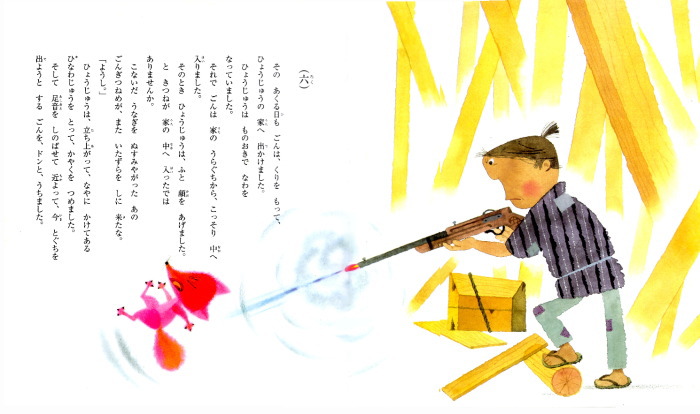 |
|||||||||||||||||||||||
そのあくる日も ” ごん ” は、くりを持って、兵十の家へ出かけました。 The following day, Gon went out to Hyoju’s house with chestnuts as well. |
|||||||||||||||||||||||
兵十は物置でなわをなっていました。 それでごんは、家のうら口から、こっそり中へ入りました。 Hyoju was making a rope in the storage room. So, Gon snuck in through the back door of the house. |
|||||||||||||||||||||||
そのとき兵十は、ふと顔を上げました。と、きつねが家の中へ入ったではありませんか。 こないだうなぎを ぬすみやがった、あの ごんぎつねめが、また いたずらを しに来たな。 Just then, Hyoju suddenly looked up. That wily Gon fox, who stole my eel the other day, came back to do mischief. |
|||||||||||||||||||||||
|
|||||||||||||||||||||||
「ようし。」 兵十は、立ち上がって、 納屋(なや)にかけてある火なわじゅうを取って、火薬をつめました。 ” Okay. ” Hyoju stood up, took the matchlock rifle off the wall of the shed, and filled it with gunpowder. |
|||||||||||||||||||||||
|
|||||||||||||||||||||||
そして足音をしのばせて近よって、 今、戸口を出ようとするごんを、ドンとうちました。 Then, he got closer with stealthy steps and shot Gon who was about to leave the door. |
|||||||||||||||||||||||
|
|||||||||||||||||||||||
 |
|||||||||||||||||||||||
| ” ごん ” は、ばたりとたおれました。兵十はかけよってきました。 Gon fell down with a thud. Hyoju ran to him. |
|||||||||||||||||||||||
家の中を見ると、土間に くりが かためて置いてあるのが 目につきました。 As he looked inside the house, he noticed that the chestnuts were left on the dirt floor altogether. |
|||||||||||||||||||||||
|
|||||||||||||||||||||||
「おや。」と、兵十はびっくりして ” ごん ” に目を落としました。 ” What. ” Hyoju was surprised and looked down toward Gon. |
|||||||||||||||||||||||
「 ” ごん ” 、おまいだったのか。いつも くりを くれたのは。」 “ Gon, was that you who always gave me chestnuts? ” |
|||||||||||||||||||||||
|
|||||||||||||||||||||||
” ごん ” は、ぐったりと目をつぶったまま、うなづきました。 Gon limply nodded with his eyes closed. |
|||||||||||||||||||||||
|
|||||||||||||||||||||||
兵十は、火なわじゅうをばたりと取り落としました。 青いけむりが、まだつつぐちから 細く出ていました。 Hyoju dropped the matchlock rifle. Blue smoke was still coming out from the muzzle narrowly. |
|||||||||||||||||||||||
|
|||||||||||||||||||||||
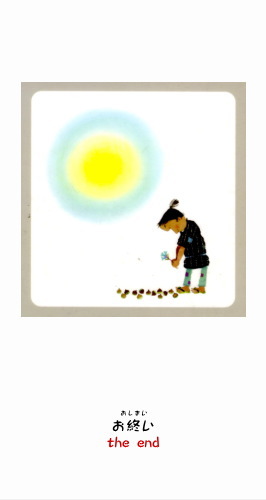 |
|||||||||||||||||||||||
| 「ごんぎつね」について | |||||||||||||||||||||||
| 昭和女子大学名誉教授・児童文学者 西本 鶏介 | |||||||||||||||||||||||
|
|||||||||||||||||||||||
| 作 : 新美 南吉(にいみ・なんきち) | |||||||||||||||||||||||
|
|||||||||||||||||||||||
| 絵 : 岩本 康之亮(いわもと・こうのすけ) | |||||||||||||||||||||||
|
|||||||||||||||||||||||
